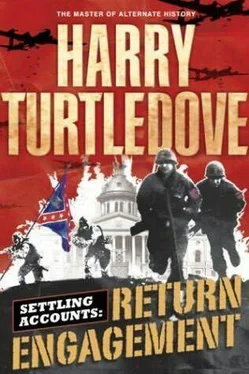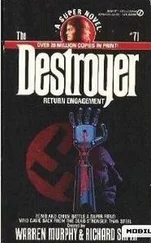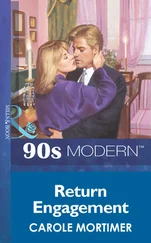Harry Turtledove - Return engagement
Здесь есть возможность читать онлайн «Harry Turtledove - Return engagement» весь текст электронной книги совершенно бесплатно (целиком полную версию без сокращений). В некоторых случаях можно слушать аудио, скачать через торрент в формате fb2 и присутствует краткое содержание. Жанр: История, на английском языке. Описание произведения, (предисловие) а так же отзывы посетителей доступны на портале библиотеки ЛибКат.
- Название:Return engagement
- Автор:
- Жанр:
- Год:неизвестен
- ISBN:нет данных
- Рейтинг книги:5 / 5. Голосов: 1
-
Избранное:Добавить в избранное
- Отзывы:
-
Ваша оценка:
- 100
- 1
- 2
- 3
- 4
- 5
Return engagement: краткое содержание, описание и аннотация
Предлагаем к чтению аннотацию, описание, краткое содержание или предисловие (зависит от того, что написал сам автор книги «Return engagement»). Если вы не нашли необходимую информацию о книге — напишите в комментариях, мы постараемся отыскать её.
Return engagement — читать онлайн бесплатно полную книгу (весь текст) целиком
Ниже представлен текст книги, разбитый по страницам. Система сохранения места последней прочитанной страницы, позволяет с удобством читать онлайн бесплатно книгу «Return engagement», без необходимости каждый раз заново искать на чём Вы остановились. Поставьте закладку, и сможете в любой момент перейти на страницу, на которой закончили чтение.
Интервал:
Закладка:
Like most of what CSON played, the song was norteno music, full of thumping drums and accordion. The singer used the same blend of Sonora's two languages as the announcer. That made Rodriguez frown a little. When he was a young man, norteno music had been in Spanish alone-even though its instruments were borrowed from German settlers along the old border between Texas and Mexico. Because that was what he'd grown up with, he thought it right and natural. As the years went by, though, English advanced and Spanish retreated in his home state.
When the syrupy love song ended, a blaring march-a Confederate imitation of John Philip Sousa-announced the hour and introduced the news. "Here is the truth," the newscaster said: the Freedom Party's claim to it, these days, was far from limited to Jake Featherston alone. Another march, a triumphant one, rang out. That meant the newscaster was going to claim a victory. Sure enough, he spoke in proud tones: "Your brave Confederate soldiers have closed an iron ring around Columbus, Ohio. Several divisions of Yankee troops are trapped inside the city. If they cannot break out, they will be forced to surrender."
"That's amazing," Rodriguez said to Magdalena. "To have come so far so fast… Neither side did anything like this in the last war."
"Shh," she told him. "If we're going to listen, let's listen." He nodded. A wise husband didn't quarrel even when he was right. Quarreling when you knew you were wrong was a recipe for disaster.
The newscaster said, "Here is Brigadier General Patton, commander of the Army of Kentucky's armored striking force."
In pure English, a man with a raspy, tough-sounding voice said, "We've got the damnyankees by the neck. Now we're going to shake them till they're dead." For those who couldn't follow that, the announcer translated it into the mixed language commonly used in the Confederacy's Southwest. The officer-General Patton-went on, "They thought they were going to have things all their own way again this time. I'm here to tell them they've missed the bus."
Hipolito Rodriguez followed that well enough. He glanced over to Magdalena. She was waiting for the translation. He hadn't had much English, either, before he went to war. These days, he dealt with it without thinking twice.
The announcer went on to talk about what he called a terror-bombing raid by U.S. airplanes over Little Rock. "Forty-seven people were killed, including nineteen children sheltering at a school," he said indignantly. "Confederate bombers, by contrast, strike only military targets except when taking reprisals for U.S. air piracy. And President Featherston vows that, for every ton of bombs that falls on the Confederate States, three tons will fall on the United States. They will pay for their aggression against us."
"This is how it ought to be," Rodriguez said, and his wife nodded.
"In other news, the reckless policies of los Estados Unidos have earned the reward they deserve," the newscaster said. "The Empire of Japan has declared war on the United States, citing their provocative policy in the Central Pacific. The United States claim to have inflicted heavy losses on carrier-based aircraft attacking the Sandwich Islands, but the Japanese dismiss this report as just another U.S. lie."
"They are supposed to be very pretty-the Sandwich Islands," Magdalena said wistfully.
"Nothing is pretty once bombs start falling on it," Rodriguez replied with great conviction. "That was true in the last war, and it is bound to be even more true in this one, because the bombs are bigger."
"Prime Minister Churchill calls the entry of Japan into the war a strong blow against the United States," the announcer went on. "He says it will restore the proper balance of power in the Pacific. Once the United States are driven from the Sandwich Islands, Japanese-Confederate cooperation against the West Coast of the USA will follow as day follows night, in his opinion."
That was a very large thought. Rodriguez remembered that the Japanese had bombed Los Angeles during the Pacific War. But that had been only a raid. This could prove much more important. Of course, the Japanese hadn't pushed los Estados Unidos out of the Sandwich Islands. If they did, that would be wonderful. If they didn't, they would still tie up a big U.S. fleet. Too bad they wouldn't be able to pull off a surprise attack, the way the USA had against Britain at the start of the Great War.
In portentous tones, the newscaster continued, "Prime Minister Churchill also spoke of the pounding Berlin, Munich, Frankfurt, and other German cities have taken from the French and British air fleets. Smoke climbs thousands of feet into the sky. German efforts to retaliate are feeble indeed. The Prime Minister also declares that the collapse of the Ukraine at Russia's first blows and the clear weakness of Austria-Hungary argue the war in Europe will go differently this time."
Hipolito Rodriguez tried to imagine another war across the sea, a war as big as the one here in North America and even more complicated. He had trouble doing it. He would have had trouble imagining the war here if he hadn't fought in the last one. That was what came of peacefully living most of his life on a farm outside a small town in Sonora.
"In a display of barbarism yesterday, the United States executed four Canadians accused of railroad sabotage," the newsman said. "Confederate security forces in Mississippi, meanwhile, smashed a squadron of colored bandits intent on murdering white men and women and destroying valuable property. The mallates and their mischief will be suppressed."
He sounded full of stern enthusiasm. Rodriguez found himself nodding. He'd suppressed mallates himself-niggers, they called them in English. That had been his first taste of war, even before he faced the Yankees. As far as he was concerned, black men caused nothing but trouble. He had another reason for despising them, too. They were below folk of Mexican descent in the Confederate social scale. If not for blacks, the white majority would have turned all its scorn on greasers. Rodriguez was as sure of that as he was of his own name.
A string of commercials followed. The messages were fascinating. They made Rodriguez want to run right out and buy beer or shampoo or razor blades. If he hadn't lived three miles from the nearest general store, he might have done it. Next time he was in Baroyeca, he might do it yet.
More music followed the commercials. The news was done. Rodriguez said, "The war seems to be going well."
"No war that has our son in it is going well." Now Magdalena was the one whose voice held conviction.
"Well, yes," Rodriguez admitted. "Tienes razon. But even if you are right, wouldn't you rather see him in a winning fight than a losing one? Winning is the only point to fighting a war."
His wife shook her head. "There is no point to fighting a war," she said, still with that terrible certainty. "Win or lose, you only fight another one ten years later, or twenty, or thirty. Can you tell me I am wrong?"
Rodriguez wished he could. The evidence, though, seemed to lie on his wife's side. He shrugged. "If we win a great victory, maybe los Estados Unidos won't be able to fight us any more."
"They must have thought the same thing about los Estados Confederados," Magdalena said pointedly.
"They did not count on Jake Featherston." Rodriguez missed that point.
His wife let out an exasperated sniff. "Maybe they will have that kind of President themselves. Or maybe they will not need a man like that. They are bigger than we are, and stronger, too. Can we really beat them?"
"If Senor Featherston says we can, then we can," Rodriguez answered. "And he does, so I think we can."
"He is not God Almighty," Magdalena warned. "He can make mistakes."
"I know he can. But he hasn't made very many," Rodriguez said. "Until he shows me he is making mistakes, I will go on trusting him. He is doing very well so far, and you cannot tell me anything different."
Читать дальшеИнтервал:
Закладка:
Похожие книги на «Return engagement»
Представляем Вашему вниманию похожие книги на «Return engagement» списком для выбора. Мы отобрали схожую по названию и смыслу литературу в надежде предоставить читателям больше вариантов отыскать новые, интересные, ещё непрочитанные произведения.
Обсуждение, отзывы о книге «Return engagement» и просто собственные мнения читателей. Оставьте ваши комментарии, напишите, что Вы думаете о произведении, его смысле или главных героях. Укажите что конкретно понравилось, а что нет, и почему Вы так считаете.












